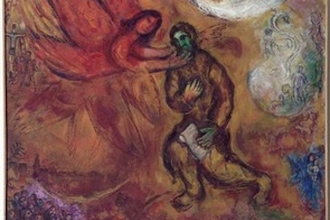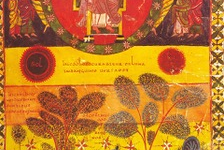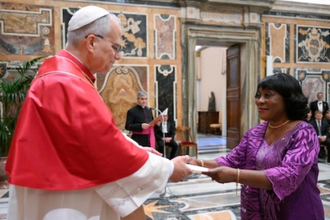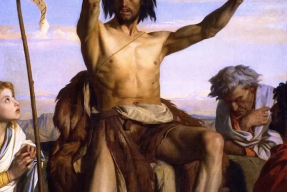Sunday Reflection with Canon Robin Gibbons: 22 June 2025
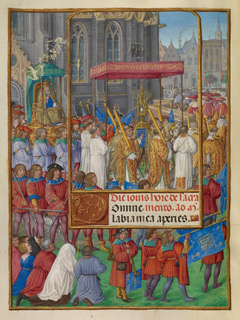
Master of James IV of Scotland (Flemish about 1541) Corpus Christi Procession Google Art Project
The Solemnity of the Most Holy Body and Blood of Christ
Lectionary: 169
Introduction
Given the deep rootedness of Corpus Christi in the western Catholic tradition, its powerful festive hold on many of our communities, we can enjoy its rather homely, lay, devotional context as a time for first communions, processions and festal celebrations around adoration and benediction of the Sacrament, as well as a reminder of that pastoral ministry of bringing communion for the sick and viaticum for the dying. I want to open out this wonderful mixture and inject into my own reflection some insights from our eastern Catholics who do not celebrate this feast, and yet through their deep reverence for the sacred mysteries contained in the celebration of the Eucharist, share with us a powerful conviction that we do indeed receive the very body and very blood of the Saviour at communion, but that this reception can never be divorced from the whole context of what it means to be a Catholic Christian.
The wider context of the feast
The context of this feast, as Luke points out to us, is 'the Kingdom of God' and our pastoral task of proclaiming it to the world in which we live. Immediately that should make us realise that our use of the term 'body and blood of Christ' not only refers to the consecrated Eucharistic elements of bread and wine, but also to the wider dimensions of Christ's body and blood-beginning with those who receive it in the Eucharist: For it requires faith, and our faith is part of a calling and a process which begins with enquiry, catechumenate, baptism and confirmation, and then progresses via the constancy of the Sunday Eucharist all through our lives. It does not depend on our own worthiness, for example we receive forgiveness in the sacrament of Reconciliation, and then healing in our reception of Communion itself, even though we are not worthy.
All our sacraments help draw us closer to the Christ of the Eucharist. We rejoice in the sacrament of love in Marriage and in that vocation to ministry in Holy Orders. When we are sick or in deep distress, the healing gift of the Sacrament of the Sick is there for us; and at the last, trusting in sure and certain hope we receive Viaticum, that medicine of immortality, and our last earthly food for that final journey to the door of life, that which opens for us into the fullness of the Kingdom we have proclaimed all our life. All of these formal encounters, the Church's life-giving sacraments, are the normal context of the Spirit's gift of Christ coming to us, binding us ever closer as part of His body.
Meals with Christ
To help us enrich the meaning of this feast I remind myself of the power of food and drank at mealtimes and its integration into our faith journey. This is a factor our eastern Christians know well, that of the balance between fast and feast, of preparation to receive the Divine Elements themselves, something we seem to have lost, of deep history in the wonderful Jewish origin of the Eucharist, as yes, Passover and ritual meals, including the Sabbath blessing, but also for the Christian in the completion of the Passover, where Christ's own self offering as the Lamb of God, takes away for ever, the necessity of sacrificial blood gifts.
It pays us great spiritual dividends if we can continually remind ourselves that all meals which we bless and share are echoes of the Eucharist itself, for in the gospels all meals with Jesus are important, as is the world of symbol and ritual, colour light and smell which hint at the immensity of this gift. The Eastern tradition teaches us to lay aside our rigid definitions of what the Eucharist is as and when we 'celebrate it' together , and instead let ourselves go as we humbly line up to receive the sacred elements, and by doing so let Christ enter us so in trustful faith, so that He becomes the real the truth of the the mystery growing within us-as we become the very Body of Christ!
Luke's Gospel of the five thousand
Let us just reflect on Luke's account of the feeding of the five thousand, our Gospel for this feast:
'He said to them, "Give them some food yourselves." They replied, "Five loaves and two fish are all we have, unless we ourselves go and buy food for all these people."Now the men there numbered about five thousand. Then he said to his disciples, "Have them sit down in groups of [about] fifty."They did so and made them all sit down.Then taking* the five loaves and the two fish, and looking up to heaven, he said the blessing over them, broke them, and gave them to the disciples to set before the crowd'. (Lk 9: 14-16)
What does this account add to our appreciation of Corpus Christi? The first hint is in people's hunger and in the command for us to feed them in Christ's name. If my sister or brother is hungry they must be fed, it is then, through that commitment found in John's account of the Institution of the Eucharist we are also to 'wash their feet' which forms part of the narrative, and is a dominical command, that we start by learning to love them actively, and only after that tdo we approach the table of the Kingdom and receive the Lord.
John Paul II reminded us of these words he took from our Eastern tradition :
" Saint John Chrysostom's commentary on these words is profound and perceptive: "For what is the bread? It is the body of Christ. And what do those who receive it become? The Body of Christ - not many bodies but one body. For as bread is completely one, though made of up many grains of wheat, and these, albeit unseen, remain nonetheless present, in such a way that their difference is not apparent since they have been made a perfect whole, so too are we mutually joined to one another and together united with Christ".(John Paul II Ecclesia de Eucharistia 2000. C2:17)
Nourishing others by faith
A second thought is that we are called to nourish others in an active faith. To become Christ's body, we need by prayer and example to help others enter into the mystery of the Eucharist. John Chrysostom in a homily on the Eucharist reminds us of that connection between feeding the hungry and receiving the Body and Blood of Christ:
' Do you wish to honour the body of Christ? Do you ignore him when he is naked? Do not pay homage in the temple clad in silk, only then to neglect him outside where he suffers cold and nakedness. He who said, 'This is my body,' is the same One who said: 'You saw me hungry and gave me no food,' and 'Whatever you did to the least of my brothers you did also to me.'
This is a powerful indication that reception of the Eucharist is indissolubly tied up with seeking out and healing the broken Body of Christ in others. The context is there in the Gospel where Christ asks the disciples to feed the hungry, just as he does us, and then, and only then may we sit down with the Master at the table of the Kingdom.
Christ is the host at the table of the Kingdom
This route of active ministry is tied to a third hint connected to another dimension of this wonderful feast; that it is only with Christ and in his name, and that of the Trinity, can we bless each other, our food and our Eucharist. We have no monopoly on the Body and Blood of Christ, nor are we ever to use it as a weapon of exclusion as sometimes happens, it is Christ's gift, he is master of the Eucharistic feast and host at the table of the Kingdom, and he is inclusive.
There are of course cases where the problem of a persons actions are so great and so well known, that they need to refrain from reception of the Eucharist until true repentance is shown-but we need to take on board a little more, that the Eucharist is also the medicine of immortality, a remedy for sinners. Pope Francis in his Angelus address for Corpus Christi in 2021, reminded us of this image, describing the Eucharist, not as the reward of saints, but as the Bread of sinners, he pointed out that each time we receive the Bread of Life, the Lord comes to give new meaning to our fragilities. And so it does, always!
Let us rejoice in the mystery of this feast, but also enjoy the many elements that unfold before us as we contemplate the Lord's great gift of His Body present in so many aspects of our world, bound together in that continually feeding gift of the nourishing heavenly food. It is not only a feast recognising the deep and abiding presence of Christ in the Eucharist but one which draws all aspects of the reality of His presence together.
Our task
The following words from St Paul, our second reading today, are a wonderful summary of all that this feast contains, may we hand this gift on!
'Brothers and sisters:
I received from the Lord what I also handed on to you,
that the Lord Jesus, on the night he was handed over,
took bread, and, after he had given thanks,
broke it and said, "This is my body that is for you.
Do this in remembrance of me."
In the same way also the cup, after supper, saying,
"This cup is the new covenant in my blood.
Do this, as often as you drink it, in remembrance of me."
For as often as you eat this bread and drink the cup,
you proclaim the death of the Lord until he comes.
Amen'. (1 Corinthians 11:23-26)



